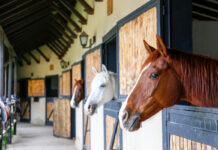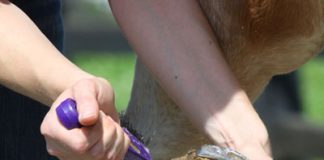
If your horse is receiving plenty of feed but isn’t gaining weight, look at some other factors that could be contributing to his weight loss.
Sudden or chronic weight loss in any animal is cause for concern and your horse is no exception. Finding the reason behind the weight loss is key for proper management, but sometimes determining the cause is a challenge. Here are the most common causes for weight loss in horses and tips to help bring your horse’s weight back up to where it needs to be.
Stress: Training, Herd Dynamics, and Changes to Routine
Horses, like humans, can be negatively affected by stress. A new environment, new herd dynamics, a sudden health issue, or even a new training regimen—these can all be sources of equine stress, especially for a high-strung horse. As a result, appetite can decrease. Of course this in itself can cause weight loss, but the insidious development of painful gastric ulcers as both a result of stress and decreased feed consumption can result in lost pounds as well.Intestinal Parasites
Gastrointestinal parasites not only rob your horse of nutrients but also cause inflammation and damage to the lining of the digestive tract. This hampers your horse’s ability to absorb nutrients and can result in malnutrition and weight loss.Dental Problems
One hidden sharp point on a molar is enough to cause severe oral pain. This can cause a horse to drop feed when eating (called quidding), be unable to properly chew and digest food, or even avoid some feed. Uneven wear, missing teeth, and misaligned teeth can all result in sharp points along the tongue or along the inside of the cheek in a horse’s mouth. Weight loss due to dental issues is a common problem seen especially in senior horses.Chronic Illness and Disease
Chronic illness such as liver or kidney disease can result in weight loss from the physiological damage to vital organs. Chronic disease, such as some cancers, can also result in the production of inflammatory hormones that affect digestion and the horse’s appetite.Inadequate Diet: Low-Quality Hay and Grain or Insufficient Quantity
Poor quality roughage or inadequate caloric intake is perhaps one of the simplest causes of weight loss in horses. Young, growing horses should not be fed in the same manner as mature pleasure horses; likewise for lactating mares and high-level equine athletes. Each of these classes of horses has specific dietary requirements in terms of calories and protein. Management issues such as herd dynamics can also affect a horse’s diet. For example, if an older horse is bullied by a younger, stronger herd mate, the senior horse may be run off from hay or feed and not allowed to eat.

High-quality forage, such as grass hay, is the cornerstone of a healthy equine diet.
Also remember that seasonal weather and hormonal changes can influence weight loss. Many horses, particularly senior horses, lose weight in the winter and will gain it back over the summer. Some mares will lose weight while in estrus during the breeding season. Knowing your own horse’s individual habits and needs is one of the best ways to help him reach his optimal weight.
First Steps to Identifying the Cause of Your Horse’s Weight Loss
If you notice your horse losing weight, have your vet out to perform a full physical exam, including dental exam, and take blood and manure for analysis. Ruling out a health issue should be the first step in figuring out a cause behind a horse’s weight loss. A blood analysis will help evaluate liver and kidney function, as well as protein and glucose levels. Endocrine diseases, which may affect weight, can also be diagnosed through blood tests. Your veterinarian will determine which tests are the most appropriate for your horse based on history and clinical signs.
Safe Weight Gain
Once health problems have been ruled out or diagnosed and treated and management issues have been addressed, your goal should be for your horse to gain weight back gradually. Getting your horse back to his appropriate body weight is an exercise in patience. This will require regular weight assessments to objectively monitor progress.
Monitoring the weight of a horse is difficult unless you have a measurement tool. Weight tapes are the most practical for on-the-farm use and provide a relatively good estimate of body weight in pounds. Have your vet demonstrate the proper positioning to read a weight tape on your horse and develop a habit of measuring the weight tape every month in order to track long term trends.

A weight tape is a useful tool for estimating and monitoring your horse’s weight.
To help your horse gain weight, first have your hay and/or pasture analyzed for nutrients. Your veterinarian will be able to offer guidance in where to send your samples and how to interpret the results. If an analysis shows that your hay is of low quality, find another source, but again test to verify that you are providing the quality your horse needs. If your pasture is low quality, talk to your veterinarian about providing dietary supplementation either in the form of hay or grain. Remember that pasture quality varies heavily with the season as well. Providing access to high quality roughage alone can do wonders for some thin horses.
Find the Right Feed for Your Horse
If you are providing a complete feed for your horse, compare the feed’s ingredients and label with your horse’s age, physical fitness, health status, and weight. Ask yourself the following questions:
- Are you feeding enough?
- Are you feeding at adequate intervals?
- Does the feed provide adequate nutrients that your horse requires at his present life stage?
- Does your horse actively eat his feed or is there some left behind?
Talk with your veterinarian if you have decided to switch your horse’s feed. Any feed changes should be gradual; take at least a week to ease your horse into a new diet to prevent gastrointestinal upset.
If your horse is in dire need of calories, increase fat. This can be done easily by top-dressing with vegetable oil. Again, like with any diet change, start small and slowly. Add a quarter cup of vegetable oil to the feed for starters and then increase up to a half cup twice daily if needed. Too much oil will result in loose stool. If this occurs, simply decrease the amount given.
If Your Horse Still Can’t Gain Weight…
If, after a few months, despite changes in feed management, you do not notice weight gain in your horse, contact your veterinarian again. Further diagnostics may be required.
ANNA O’BRIEN, DVM, is a large-animal ambulatory veterinarian in
central Maryland. Her practice tackles anything equine in nature, from
Miniature Horses to zebras at the local zoo with a few cows, goats,
sheep, pigs, llamas, and alpacas thrown in for good measure. Follow her on Twitter: @annaobriendvm.






Great tips. Certainly not a usual problem but it happens.
great info
You guys always provide excellent, authoritative information.
Here in the upper Midwest we’ve had weight problems with our Arabian. Personally, I don’t think they’re genetically equipped to handle our sub zero winters. So, this winter in addition to regular feedings of grain and hay, I feed him a warm bucket of beet pulp with molasses at 11:00 P.M. every night. This gets him through the night and put the weight back on him fairly quickly. When everything else failed, this did the trick.
I HAVE A 18YR OLD PAINT….HE STARTED LOOSING WEIGHT OVER LAST WINTER…ALOT OF WEIGHT….I STARTED FEEDING HIM COOKED OATS AND BEET PULP TWICE DAILY FOR ABOUT TWO MONTHS…HE GOT HIS WEIGHT BACK TO ALMOST NORMAL THIS SPRING….HE STARTED LOOSING WEIGHT AGAIN….HIS LIVER ENZYMES WERE ELEVATED.. I PUT HIM ON LIVERTROPE TO HELP HIS LIVER…WHAT ELSE CAN I DO FOR HIM?…..